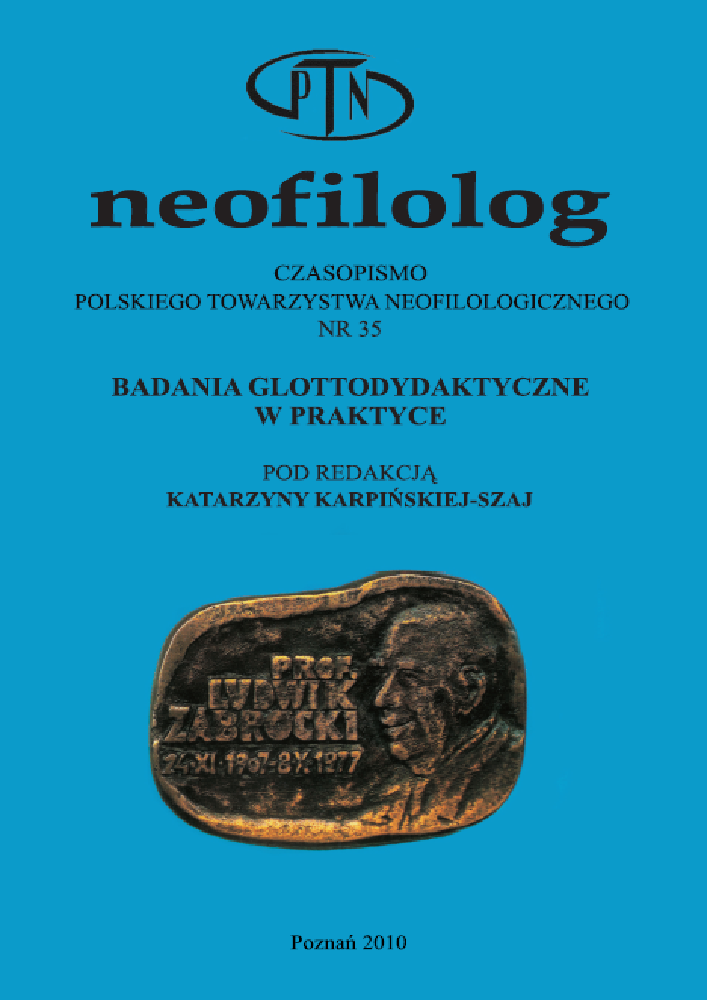Abstract
Diagnosis is one of teachers’ (including foreign language teachers) key tasks. The teacher should get to know his or her learners and their intellectual abilities before beginning the process of developing their language
competence. Unfortunately, Polish teachers lack standard tools of measuring foreign language learning aptitude. Such a situation follows from insufficient knowledge in this field. Another reason is the scarcity with
which this issue is discussed. The aim of this article is to discuss the ways of diagnosing foreign language learning aptitude that have been attempted so far both in Poland and abroad. This will constitute the background for the analysis of the present tools for measuring foreign language learning aptitude and the possibilities of applying them in research into foreign language learning and teaching. This analysis takes as a point of reference the current theory of abilities involved in learning a foreign language.
References
Apelt, W. 1982. „Individuelle Leistungsdispositionen im fremdsprachigen Lernprozess”. Deutsch als Fremdsprache 3: 150-152.
Biedroń, A. 2008. „Koncepcja zdolności językowej a atrybucyjna teoria motywacji i emocji Bernarda Weinera” (w) Nowe spojrzenia na motywację w dydaktyce języków obcych (red. A. Michońska-Stadnik i Z. Wąsik). Wrocław: Wyższa Szkoła Filologiczna: 27-34.
Carroll, J.B. 1993. Human cognitive abilities: A survey of factor-analytic studies. Cambridge: CUP.
Carroll, J.B., Sapon, S.M. 2002 (1959). Modern Language Aptitude Test. Bethesda, MD: Secondo Language Testing.
Esser, U. 1982. „Ein allgemeinpsychologischer Ansatz zur Diagnose der Fremdsprachenlernbefähigung”. Deutsch als Fremdsprache 2: 76-81.
Esser, U. 1983. „Personale und soziale Faktoren des Fremdsprachenerwerbs”. Deutsch als Fremdsprache 2: 71-77.
Grigorenko, E.L., Sternberg, R.J., Ehrman, M.E. 2000. „A theory-based approach to the measurement of foreign language learning ability: The CANAL-F theory and test”. Modern Language Journal 84(3): 390-405.
Hornowska, E., Paluchowski, W. J. 2004. „Kulturowa adaptacja testów psychologicznych” (w) Metodologia badań psychologicznych. Wybór tekstów. (red. J. Brzeziński). Warszawa: PWN: 151-191.
Kuliniak, R. 2002. Test Predyspozycji Językowych dla uczniów gimnazjum. Wałbrzych: BIMART.
Ministerstwo Edukacji Narodowej o uczniu zdolnym. Biblioteczka Reformy 15. 1999.
Nęcka, E. 2005. Inteligencja. Geneza, struktura, funkcje. Gdańsk: GWP.
Niżegorodcew, A. 1975. „Przydatność tzw. testu prognostycznego jako metody pomiaru zdolności do uczenia się języka obcego u młodzieży licealnej”. Języki Obce w Szkole 5: 299-303.
Niżegorodcew, A. 1979. „Rola specjalnych uzdolnień w nauce języków obcych w szkole”. Przegląd Glottodydaktyczny 3: 31-42.
Pimsleur, P. 1966 (2003). The Pimsleur Language Aptitude Battery. Bethesda, MD: Second Language Testing.
Rysiewicz, J. 2006. „Uzdolnienia językowe. Nieporozumienia a rzeczywistość badawcza”. Neofilolog 29: 17-25.
Rysiewicz, J. 2007. „A study on the prediction of success in the learning of English as a SL” (w) On foreign language acquisition and effective learning (red. J. Arabski). Katowice: Wydawnictwo Uniwersytetu Śląskiego: 133-156.
Rysiewicz, J. 2008. „Measuring foreign language learning aptitude. Polish adaptation of The Modern Language Aptitude Test by Carroll and Sapon”. Poznan Studies in Contemporary Linguistics 44 (4): 569-595.
Ustawa o Systemie Oświaty z dn. 7. 09. 1991, DzU. z 2004 r. Nr 256, poz. 2572
Vollmer, H.J. 1982. Spracherwerb und Sprachbeherrschung. Untersuchungen zur Struktur von Fremdsprachenfähigkeit. Tübingen: Günter Narr Verlag.
Wilczyńska, W. 1999. Uczyć się czy być nauczanym? O autonomii w przyswajaniu języka obcego. Warszawa: Wydawnictwo Naukowe PWN.
Wojtowicz, M. 2006. Test zdolności językowych. Warszawa: Pracownia Testów Psychologicznych.
License
Copyright (c) 2010 Joanna Sobańska-Jędrych

This work is licensed under a Creative Commons Attribution-NoDerivatives 4.0 International License.
Authors
Authors of texts accepted for publication in Neofilolog are required to complete, sign and return to the Editorial team’s office the Agreement for granting a royalty-free license to works with a commitment to grant a CC sub-license.
Under the agreement, the authors of the texts published in Neofilolog grant Adam Mickiewicz University in Poznań a non-exclusive, royalty-free license and authorize the use of Attribution-NoDerivatives 4.0 International (CC BY-ND 4.0) Creative Commons sub-license.
The authors retain the right to the free disposal of the work.
Users
Interested Internet users are entitled to use works that have been published in Neofilolog since 2017, under the following conditions:
▪ attribution – obligation to provide, together with the distributed work, information about the authorship, title, source (link to the original work, DOI) and the license itself.
▪ no derivatives – the work must be preserved in its original form. Without the author's consent, it is not possible to distribute the modified work in the form of translations, publications, etc.
Copyrights are reserved for all texts published since 2017.
Miscellaneous
Adam Mickiewicz University in Poznań retains the property right as a whole (layout, graphic form, title, cover design, logo etc.).
